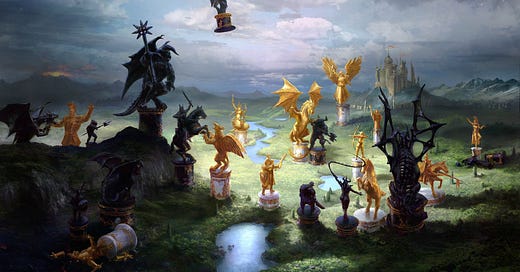I have been away from the roleplaying world for a few years, and I was curious about Justin Alexander’s new book (review coming soon), and it has this paragraph as part of it’s introduction:
A roleplaying game is a conversation. You’ll describe what the PCs see, the players will respond by telling you what their characters do in response or by asking questions to clarify their understanding of the situation, and then you’ll respond to them. It’s a loop, right? Your topic of conversation is the fictional world of the game, and you’ll build that world—and the things that happen in it—by actively engaging with that conversation. You’ll listen to each other. You’ll build on each other’s ideas. You may even get emotional or interrupt or disagree with each other, just like any other conversation.
As I say, I’ve been away from the scene for a bit, and I was never a big fan of the old narrative games so I took this as old Justin spouting absolute clap.
Unfortunately, I have since discovered this is considered canon law. This is central to the playstyle of modern groups.
Well, in my opinion, this is utterly fucking pig-headed and wrong.
This is equating the craft with the method.
This is the absolute epitome of cargo cult ideology.
Some examples of how crafts are not methods:
Carpentry is not hitting things with a hammer.
Programming is not typing on a keyboard.
Drawing is not making lines on paper.
Soccer is not kicking a ball around.
The method used is a portion of the craft, not the whole.
It’s easy enough to demonstrate how bonkers this is by using chess, which can be played verbally and mentally.
A chess game is a conversation. You will describe how your pieces move, and the other person will respond. You will each take turns describing your individual moves. It’s a loop, right? Your topic of conversation is the board of that chess game, and you’ll build the board - and the moves the pieces make - by engaging in that conversation. You’ll listen to each other. You’ll respond to each other’s ideas. You may even get emotional or interrupt or disagree with each other, just like any other conversation.
As with the chess example, roleplaying games definitely often involve conversations as the way to communicate the game state. Some games have conversations as a core mechanic.
But the idea that they are solely conversations?
Absolute fucking tripe.






I'm curious if you think this shortsightedness has practical effects on the later advice within? (I have not read it.) You say "drawing is not making lines on paper," but if I open a drawing textbook and the intro says "hey, you got this, drawing is just making lines on paper," I feel like that's not actually the claim being made.
Storygamers want the cachet of TTRPGs without the achieving the understanding and putting in the necessary effort. They are, without doubt or question, wrong.
We have a long hill to climb to take back "TTRPG", but it's a worthy climb.
You may have already seen this, but recommended for other viewers:
https://legendsmith.substack.com/p/intentional-designs-rpgs-have-procedures